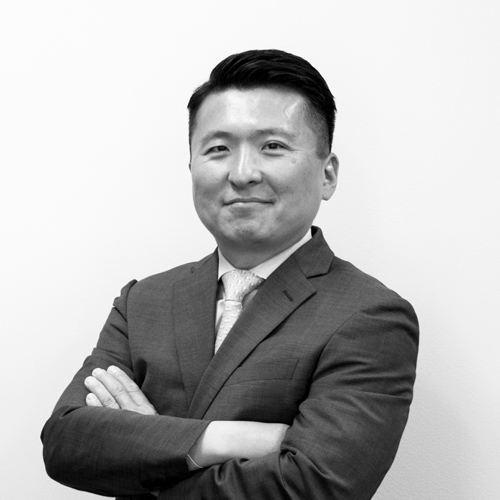Frederic Tenney’s journey to becoming chief intellectual property (IP) counsel for top industrial manufacturer Arconic is far from conventional. While he’s currently responsible for all IP matters for Arconic and its subsidiaries around the world, Tenney’s original plan was to become an engineer.
“I loved the study of engineering, but not the practice of it,” Tenney recalls about his time studying biomedical engineering at Duke University. His work instilled in him a love of the design and science behind engineering. While there, he and his partner created a low-rate demand pacemaker designed to activate when a patient’s heartbeat fell below sixty beats per minute. However, he soon found himself dissatisfied with the grunt work and isolation that often came with his studies. “Wiring and soldering the prototype over all four days of Thanksgiving break in a windowless lab was painfully boring, at least for me,” Tenney says.
Fortunately for Tenney, the next semester he stumbled upon an engineering course that taught him the need for litigators with engineering knowledge. This knowledge gives them the ability to translate engineering lingo to juries. Next, he decided to go to law school to become a litigator—first at Wake Forest University, then returning to Duke. Still, Tenney found himself desiring something more challenging.
It was then that Tenney shifted to IP law, where he felt his engineering knowledge could find a productive use. Tenney relished the chance to apply his existing passion for the science and design of engineering to a context that would maximize personal interest.
“It provided the opportunity to become intimately involved in the science and, at the same time, gave me the ability to explain and defend why IP mattered to governments across the globe,” he says. Interning at several reputable firms during law school—including Womble Carlyle, Jones Day, and Foley & Lardner—Tenney developed a keen eye for patent prosecution and counseling skills (particularly at Foley, where he worked for six years after graduation). From there, he transitioned into providing in-house counsel for Otis Elevator Co. and Pratt & Whitney (both part of United Technologies Corp.), and subsequently for Alcoa Inc., which became Arconic after the company split into two separate entities in 2016.
At Arconic, Tenney finds himself engaged and fascinated by IP work that appeals directly to his history with engineering. “Every day is different,” he says. “One day, you’re focused on extracting IP value through harvesting sessions, and the next you’re looking at the strengths and weaknesses of your claims in legal filings. The next day, you’re deep in due diligence on other potential business opportunities.” For Tenney, it’s the sheer diversity and novelty of the cases that pass his desk that drives his engagement.
“When the business understands why IP matters, they begin to pull for IP resources, and that provides the necessary impetus for right-sizing the group to meet demand efficiently.”
In addition to his primary task of navigating Arconic’s unique IP cases, Tenney also trains the company’s engineering and leadership teams around the globe. One of his major goals is to foster engagement with (and appreciation for) IP. What he finds most rewarding, in many training contexts, is having one-on-one conversations with Arconic employees afterward, when they realize they could have made IP missteps in the past.
“It is in those instances that we, as IP attorneys, can make a difference not only to address what may be an immediate concern, but also to put in place the framework to help prevent recurrences of such issues in the future,” Tenney says.
Tenney’s leadership role at Arconic sees him taking on two conflicting yet equally important philosophies. Even though IP counsel should fight to protect meaningful developments, Tenney feels that prudence and caution can often be the better strategy. “Before throwing a rock at a potential infringer, we must thoroughly evaluate not only our chances for success, but also what might get thrown back at us,” he explains. Tenney also takes this level of care with IP security, which he believes is a crucial issue for a company as large as Arconic: “With great reach comes great challenges,” Tenney says.
Building a world-class IP department within Arconic involves “helping the business understand why IP matters.” Businesses such as Arconic must often weigh the pros and cons of maintaining an expensive patent application or IP annuity with the potential gains that may result. As such, one of Tenney’s primary tasks is performing effective IP reviews and educating his colleagues and employees about the importance of IP in their work. “When the business understands why IP matters, they begin to pull for IP resources, and that provides the necessary impetus for rightsizing the group to meet demand efficiently,” Tenney says.
Given Tenney’s unconventional path to IP as well as his love of engineering, would he ever go back to engineering? “I think the ship on an engineering career sailed years ago,” he says. “I don’t, however, regret missing that boat for an instant.”
Though he enjoys the complexity and science of engineering, he relates more to the creative thinking required in legal work. “Although engineering strives to teach that there is only one correct answer, in my reality, there may be multiple,” Tenney says.
Tenney’s work at Arconic may take a different mind-set than engineering, but his roots in the field heavily inform his approach to IP law. “Engineering is one of the many things that got me where I am today,” he says. “And, for that, I am eternally grateful.”
***
Greenberg Traurig, LLP:
“Greenberg Traurig offers its heartfelt congratulations to Ric Tenney on his feature in Modern Counsel. This is a well-deserved honor for his outstanding leadership and accomplishments.”

